Ankara IMPLANT Treatment
What is
Dental Implant?
It is an artificial tooth application.
It is performed in order to restore normal chewing function, to rule out possible systemic body health risks, and to address aesthetic needs/anxieties in oral structures that have lost their entire tooth or have teeth that have lost their health to such an extent that they cannot perform their normal function irreversibly.
On the "artificial tooth root", which is formed by the method of adapting (implanting) the apparatus made of titanium element, which is known to have no compatibility problems with the body, to the jawbone through surgical intervention, with materials known to be very resistant to high pressures during chewing in the mouth, such as zirconia or porcelain, in the following process. wearing "artificial tooth veneer"; It is called "Dental Implant Treatment".
What is an implant? &
What is a Prosthesis?
IMPLANT
In medical terms, implant is "the placement of inanimate substances in the body/living tissues to perform a function".PROSTHESIS , is a term that covers the implant. It is a mechanism/system that is "implanted" in the body to perform the work of an organ.
Dental Implant Prosthesis is the best treatment to replace a lost tooth; It is an artificial tooth.
"Dental Implant Prosthesis"
What are the constituent parts?
There are 3 main parts that make up
the artificial tooth prosthesis:
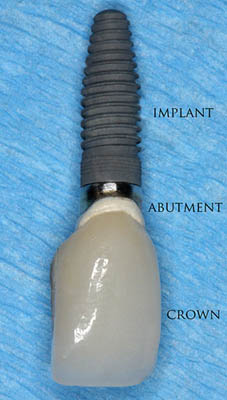
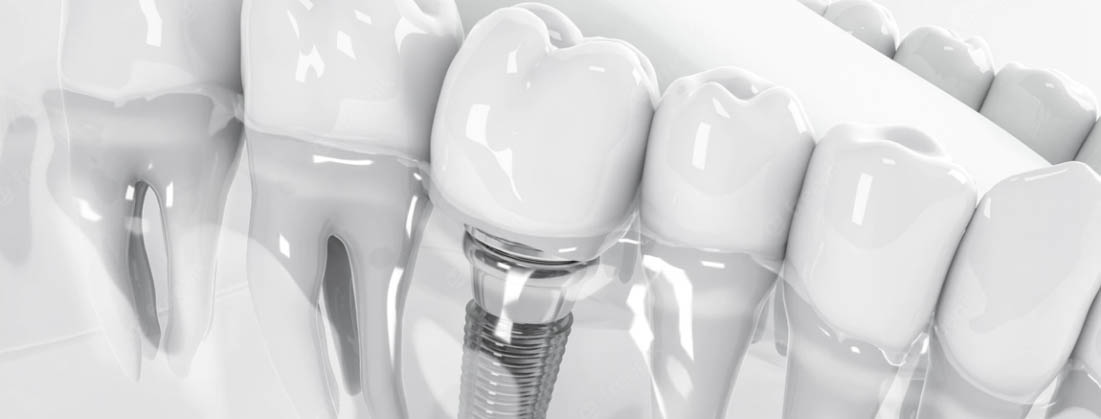
What are the situations in which dental implats are most beneficial?
1. Isolated Single Tooth Loss :
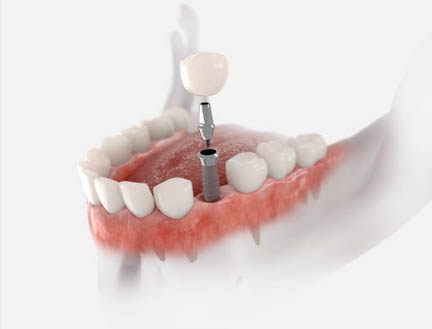
It is the most ideal application area of dental implant surgery and is the form in which the highest efficiency is obtained in the easiest way.
- Normally, in a healthy individual, when there is no extra health problem related to the surrounding soft tissue and teeth, such as loss after an unexpected trauma or recession due to caries, etc. in the previous history, it provides efficiency in the original tooth performance with a very high success rate. Another advantage is; as an alternative to the prosthesis-bridge tooth application, the teeth around the unhealthy tooth on which the veneer is applied do not necessarily have to be damaged during the treatment.
- In individuals with impaired oral health, sometimes a single tooth may be lost due to problems with the gum / bone / tooth itself. In this case, understanding the underlying cause of tooth loss and preventing the loss of other teeth from the same reason is the primary treatment, but implant-prosthesis application instead of the lost tooth should be preferred.
2. Loss of More than One Tooth : Partial Prosthesis - Bridge Over Implant :
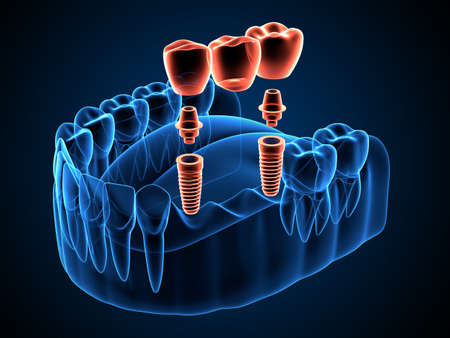
- All the disadvantages of hook-partial dentures such as discomfort, aesthetic problems, damage to surrounding teeth and tissues are problems that can be solved with implant dental prosthesis application.
3. Loss of All Teeth in the Upper/Lower Jaw: Implant Supported Total Denture :
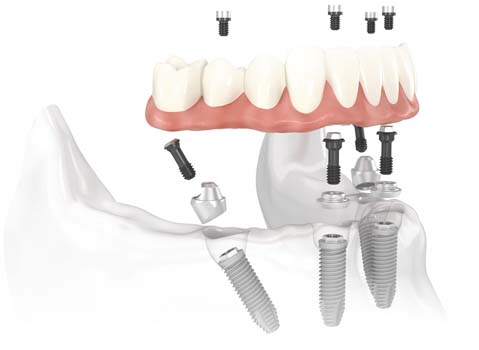
- In cases of complete loss of all teeth in the lower and/or upper jaw, implant-supported denture dental treatment, which is completely fixed to the jawbone with multiple implant supports, can be applied instead of a removable denture.
- Depending on the situation, the implant may be removable or completely fixed.
- In patients using maxillary total prosthesis / denture palate, both to ensure hygiene, to get rid of an uncomfortable - irritating apparatus in the mouth that must be constantly put on and taken off, and in addition to the feeling of nausea caused by the part sitting on the palate, deterioration/decrease of the sense of taste may occur after implant treatment. It is a completely solvable problem.
Who can have implants?
Except for who should not be implanted,
anyone can have an implant.
Who Should Not Have Implants?
- Those who are elderly and debilitated, whose implant operation will pose a risk.
- Those with immune system deficiency due to a systemic disease.
- Those with impaired/insufficient bone development due to a systemic disease.
- Those with poor wound healing due to a systemic disease.
(For example; Uncontrolled Diabetes. Blood clotting problem...)
- Those at a very early age who have not completed their bone development.
- Medically, those who do not belong to the group "Who should be implanted?" .
Who Should be Implanted?
- Dental implants are made for two main reasons.
- To provide healthy chewing function.
- To provide aesthetic integrity.
- Loss of healthy chewing function can occur for any number of reasons. However, those with implant indications are limited. The main reason for making a dental implant is the replacement of a lost tooth or the renewal of a tooth whose functions have been irreversibly lost even though it still exists in the mouth, and its presence has become more harmful than its absence.
- When considering an implant to replace a tooth that still exists in the mouth, first of all, preventive treatments (filling/canal/prosthesis...) should be considered, and it should never be considered to replace a tooth that can be saved by other interventions without a medical indication.
As the details are explained on our page on Tooth Loss; The reasons for tooth loss can be very different: loss of vitality of the tooth due to advanced tooth decay, traumatic tooth loss as a result of accidents - impacts, tooth loss due to aging, genetic absence of teeth, infection of periodontal fibers that connect the tooth to the jawbone (called "Periodontitis") caused by gingivitis, and then this causing breaking off the tooth by separating it from the bone... etc etc... can be extended further.
Regardless of the cause of tooth loss, the most radical and successful solution to health problems caused by the absence of a tooth where it should be, is to apply implant dental prosthesis treatment to the area where the tooth is missing.
Prosthetic Dental Surgery; It is the department that specializes in implant application in dentistry. The word prosthetic is derived from the same origin as the word prosthesis and is a medical term that describes the entire artificial organ used in the body. The prosthesis is used in a broader sense than the implant. While "Implant" is the part used to attach an artificial organ to the body, "Prosthesis" is the name given to all of the working parts of the artificial organ, including the implant and attached to the body by the implant.
In other words, with the term implant-prosthesis; The equation "Implant Prosthesis = Implant Screw + Connector + Crown Veneer" is meant. Details of the zircon crown or porcelain tooth veneer, which is meant by crown tooth veneer, can be found in our article : What is Dental Prosthesis? - Types of Dental Veneers?
As described with pictures on the oral and dental anatomy page; The root part of the natural tooth corresponds to the screw part made of titanium metal, which can be considered the root of the prosthesis, and the crown (tooth enamel) part of the natural tooth corresponds to the ceramic coating part of the dental prosthesis.
Dental Implant Operational Stages
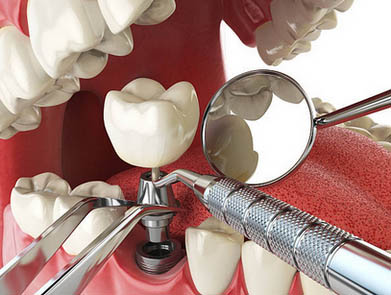
How is Dental Implant Surgery done?
Dental Implant surgical operation includes 3 basic steps:
1. The titanium root screw which will fuse into the bone gets surgically placed.
2. Titanium connector which will combine root and crown veneer denture gets set.
3. The Prosthetic crown veneer denture is placed.
What does the success of implant treatment depend on?
The success of the dental implant treatment is basically depends on the variability of the criteria below :
- Doctor performing surgery
- The implant used
- Patient being performed


:)
What are the developmental stages, risks and success rates after implant surgery?
As of 2022, according to statistical studies published in the most recent medical literature documents, the success and/or complication/risk rates in dental implant treatment are as follows:
Short-term development process and risks :
Placement of dental implants is a surgical procedure and carries the normal surgical risks of infection, bleeding and necrosis of tissues around the implant. Nearby anatomical structures such as the inferior alveolar nerve, maxillary sinus, and blood vessels may be injured during implant placement. Long-term sinus infection is rare, even if the floor of the maxillary sinus is punctured by an implant.
Post-operative
- infection
- Bleeding
- Local fracture of bone (<%5)
The first six months of process and risks :
Primary implant stability: Primary implant stability refers to the firmness of the attachment of the dental implant immediately after implantation. Failure to place the implant securely in the bone to maintain implant stability (primary stability of the implant) increases the risk of osseointegration* (secondary stability of the implant) failure.
*Osseointegration : The fusion of the titanium implant tooth root and the jawbone with each other at the cellular level.
The stability of the titanium screw implant in the patient's bone tissue after the surgery directly affects the quality and efficiency of the osseointegration in the secondary/secondary stabilization it will display during the time it is left to heal and fuse. Primary stability is critical to implantation success until bone development and healing maximizes the mechanical and biological support of the implant.
Secondary implant stability: It differs from initial stabilization because it results from a process of bone regrowth (osseointegration*) that continues into the implant.
The importance of primary implant stability gradually decreases with the regrowth of bone tissue around the implant in the first weeks after surgery, and secondary stability development comes to the fore. When the secondary stabilization healing process is complete, the initial mechanical stability in primary stabilization becomes biological stability. This usually happens within 3-4 weeks after implantation. Insufficient primary stability or high initial implant mobility may result in failure of secondary stabilization.
Failed Bone Integration : Whether an implant has fused with the bone tissue is determined by a test that can be performed between 8 and 24 weeks. Among the most frequently used criteria to determine implant success are; pain, mobility, infection, gingival bleeding, radiographic findings or melting of the 1.5 mm diameter bone around the implant can be counted.
As summarized above; The success of the dental implant depends on the experience of the operating doctor, the suitability of the implant and the factors related to the patient. The most prominent of the factors related to the patient; the amount of the patient's jawbone tissue and the quality of the bone. Another important patient-related factor; patient's oral hygiene. All these affect the fate of the primary implant stabilization phase, which is the determinant of the success of the implant in the short and medium term. Although it varies greatly according to individual risk factors, the rate of implant operation that is not successful in the primary implant stabilization stage is in the range of 1-6%. This rate is quite low, and the main reason in cases of unsuccessful bone integration is that the patient does not fully follow the recommendations and instructions of the doctor performing the oral surgery. A higher failure rate is observed in implants that are directly applied without a waiting period. Conditions that cause health problems such as drug use, smoking, improper oral hygiene also cause problems in osseointegration, which is the secondary implant stabilization stage, and cause implant loss due to bone integration failure.
Long-term development process and risks :
Long-term dental implant problems; either caused by irritation/infection/degeneration (Peri-Implantitis) in the bone and soft tissues around the implant and/or mechanical failure of the implant. Since there is no enamel on the implant, it does not deteriorate due to caries like natural teeth. In the follow-up studies, it was determined that the average implant-tooth life reached between 5-10 years at a rate of 93-98%.
Developing complications; Although it varies widely according to the patient using the implant and the type of implant used, it can be listed as follows:
Single Tooth implants (5 years)
implant survival: 97%
Tooth surface strength: 95%
Implant surrounding tissue damage: 9.7%
Peri-implant mucosal irritation: 50%
Implant fracture: 0.14%
Screw or connector loosening : 12%
Screw or connector breakage: 0.35%
Fixed Full Dentures
Progressive vertical bone loss: 8.5%
Failure in the first 1-5 years: 5%
Failure in the first 1-10 years: 7%
First 1-5 years coating breakage: 13.5%
first 1-10 years coating breakage: 51.9%
First 1-15 years coating breakage: 66.6%
First 1-5 years prosthetic screw loosening: 5%
Prosthetic screw loosening in the first 1-10 years: 15%
Removable Prostheses
Removable Denture Holder loosening in >10 years: 33%

Implant fracture requiring zirconia coating and implant bond replacement
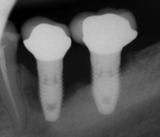
Bone loss - (As a result of Peri-Implantitis)
Smoker - 7 year implant
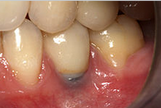
Dislocation of the implant ligament/neck from under the tooth surface with gingival recession
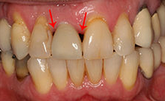
Black-looking cavities due to bone loss in the area between the implant and the natural tooth
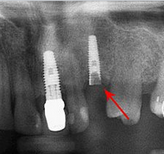
Implant screw and abuntment/ligament fracture
Dental Implant Treatment Related "information" " FAQ " ?
WHY is the implant screw made of Titanium metal?
Titanium; is a chemical element with the symbol Ti and atomic number 22. Although it is light in load due to its low density structure, it is used in special works that require strength with lightness due to its very high physical durability. The natural metal with the highest strength/weight ratio is titanium! Other features include; bright silver in color and that it has a special resistance to abrasion.
General Use :
Titanium is combined with other elements such as iron/aluminium/vanadium/molybdenum to further increase its durability, which is already tougher than some steel grades in its pure state. In this way, it is preferred as an indispensable component in the structure of medical prostheses, orthopedic implants, dental implants, dental endodontic braces, as well as being used in jet engines, missiles, space shuttle structures, the automotive industry, mobile phones, the structure of jewelry and many other industrial products. is being replaced.
As can be understood from the examples of medical applications in which titanium is used, today in modern medicine, non-organic materials placed in the body as prosthetic organs, especially the parts that are in contact with the body tissues, are mounted inside the body tissue or "planted-embedded-screwed" in the medical term "implanted". The parts that are used are almost entirely made of titanium metal. This is especially true for artificial prosthetic organs mounted in the bone.
Today, the trend of producing dental implants based on titanium material dates back to 40 years ago. The use of titanium metal in dental implantology, which is especially relevant to the general body and our subject, has been at the forefront for about 40 years, and almost all of the dental implants manufactured today are titanium-based. In recent years, experimental studies on the use of artificial dental prosthetic implant screw parts produced with zirconia/zirconium metal have passed the stage of patient applications, but sufficient statistical data has not yet been reached on the medium and long-term success of implants made of zirconium.
Medical Use :
The part of an artificial tooth that allows it to be articulated = implanted in the jawbone, so to speak, "to be hammered - buried - planted" is called "Dental implant". The process of implanting this tooth into the jawbone by screwing it in is called implantation. The material from which the dental implant is produced is the element titanium.
The use of titanium for dental prosthesis implantation within body tissues, apart from the physical reasons such as light weight and durability, also has medical reasons for preference. Our body, by its nature, tends to try to remove foreign substances from itself. This is a phenomenon that is organized and implemented by the "immune system", which is the "defense system" of our body. When we are sick, the microorganisms that cause the disease itself, i.e. microbes such as bacteria-fungus-viruses, are part of our immune-defense system, collectively referred to as "white blood cells", which spread throughout the body in our blood and even, if necessary, leave the veins and try to circulate to the avascular areas within the tissue. They are eliminated by our blood-derived cells. In addition, white blood cells are the production centers of other body defense weapons that are effective in the blood serum, which are called "antibodies" and try to neutralize any foreign substance to the body. These body defenses, briefly summarized here, not only serve to protect the body from microbes, but also sometimes cause unwanted side effects.
For example, allergies are caused by the body reacting "overly" to substances that it should not normally react to, and activating the defense systems more than necessary. Just like an implant, when a foreign body comes into contact with the internal parts of the body, many of these described and more detailed defense mechanisms, which are responsible for the internal defense of the body, are triggered, in order to remove these foreign bodies from the body or at least to neutralize them if they cannot be removed. they attack. In the transplantation of natural organs from one person to another, the failure of organ transplantation from one person to another is entirely due to these mechanisms. In other words, the body's defense system considers the transplanted organ as an enemy and tries to eliminate it from the body and succeeds. (Tissue rejection = Organ Rejection)
Similar reactions occur when non-organic substances, that is, substances that do not originate from another living thing, enter the body, but different results occur in the medium and long term, since these substances, which are naturally already inanimate, cannot be killed and removed from the body. This time, the body's defense system attacks this foreign body, which it can't cope with, while it attacks the foreign body, which increases its severity, and this foreign body begins to damage the normal body tissue around it. In this war, which the body's own defense system sees as a foreigner, which it finds strange and attacks to destroy, it wastes all its ammunition at once, while destroying the tissues around the foreign object.
In addition, when there is another body in a body tissue that enters into a chemical reaction with the tissue itself, the internal chemistry of the body tissue is adversely affected and tends to deteriorate. For example, iron metal, as we all know, has a tendency to oxidize by interacting with oxygen atoms in the environment. If the implant material is made of ferrous metal, this will cause poisoning damage to the surrounding tissues and even the whole body due to the iron that will oxidize and "rust" over time, and ultimately result in a medical intervention that will not only result in the rejection of the implant, but also in body damage.
This is an important point where titanium metal differs from other metals. Titanium is one of the rare materials that does not cause any bad reaction with body tissues in the short-middle and long-term. In other words, it is used in medical jargon as "inert", "ineffective" against body tissues, it is at least as important as its lightness and durability features in making it a favorite item of medical implantology!
In the medium and long term, the titanium metal, let alone being ineffective, shows a positive effect in the direction we want, and after the application of the titanium dental implant, it integrates with the bone and fuses with the jawbone within the 3-6 month period we expect for wound healing! This situation, which is referred to as "osseointegration", that is, bone-integration, in dentistry terminology and general medicine terms, ensures that the implant treatment is successful and the screw dental implant part, which will serve as the basis for a tooth in the mouth for many years, performs its function.
Negative Side :
Until now, we have always talked about the positive and advantageous aspects of titanium metal for us. We did not mention the only negative aspect. The only negative aspect for us is the price of the titanium material. An important factor responsible for the relative high cost of dental implants and the high costs of artificial organ prosthesis production in general is the demand for titanium as a precious metal in world markets. The use of titanium in the manufacture of dental implant screws, especially in the manufacture of medical implants and dental prosthetic teeth, unfortunately has a negative impact on the overall dental implantation cost.
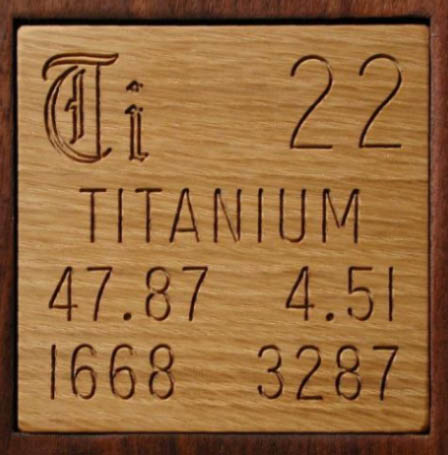
Is Dental Implant Treatment Expensive?
Wouldn't there be a cheap implant treatment?
Cheap Dental Implant ?
I have deemed it necessary to include a concise answer to this question, which is constantly asked to us by our patients who need dental implant treatment.
In my personal opinion, the main reason why this question is asked so often is; probably due to the fact that the content of the surgical intervention performed within the boundaries of implantology and the medical-technology hardware infrastructure used are not fully known...
Technological Causes :
The "dental implant" application, which is included in the scope of "prosthetic dental surgery", requires a laborious and costly process follow-up in an approach that requires the systematic control of more than one variable in order to be successful. Implantology alone is a complex surgical practice that requires the combined use of knowledge from many other disciplines.
The first of the reasons that prevent a dental implant from being cheap is the fact that the implant material has to be produced from a precious metal like "titanium".
Like the value of the material from which the dental implant is produced, the infrastructure of the manufacturing processes of this material is another factor that must be taken into account.
Dental Implant is a technological-medical product. As a "medical product", the dental implant screw, despite its tiny structure, must be perfectly integrated with the human body, of which it will act as a part, in maximum efficiency, and to function for a long time in the oral chewing environment that can reach pressures of hundreds of kilograms per square centimeter. As well as its features, it necessarily needs an exceptional knowledge of mechanical design and carefully supported production process stages. This is possible with a qualified team that can create an engineering design within micron-grade sensitivity, with the support of the most advanced technology available. In other words, a metal that is already valuable is shaped by years of R&D studies, required by a hardware and human resources team that includes a series of scientific investments that are much more valuable than itself, and ultimately reaches a technological value at a much higher level than its material value.
Although the production of a special dental implant superstructure, which is compatible with the implant screw, visible in the mouth and forming the chewing surface, is added to the production stages mentioned in a very brief way, things get complicated. It is relatively easier since the "human-patient" part, where the treatment will be applied, is just another higher level.
Human Factor :
No matter how flawlessly an implant is produced; Thanks to the knowledge and ability of the surgeon who will place the implant, it can begin to see its main function. Having the ability to perform high-risk surgical operations on the human body, unfortunately, does not reduce the responsibility of a surgeon for the risks he takes on behalf of himself and his patient in each operation. At the end of the day, a surgical operation is performed on the jawbone, between many sensitive nerves/vessels/tissues. Under these conditions, the opportunity and time required to train a person who can do such a procedure properly is one of the most important costs of the implant operation.
WHY ?
Dental implantology requires a successful organization in a process that requires the best of technology and medical expertise resources. Since it is an interdisciplinary science, Dental implant is a type of dental treatment that has a high cost in practice.
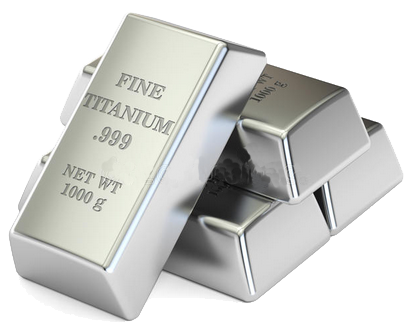
DENTAL iMPLANT PRiCES 2022 ANKARA TURKEY
How Much Is a Single Dental Implant Price?
- I wish this question was a question that can be answered in one sentence, so I would write it here and get rid of it. :)
- "How much does an implant treatment cost?" to answer this question; the type/quality of the implant used, the number of implants to be used, the nature of the implant surgery to be performed, porcelain or zirconia in the implant superstructure?... etc variants must be known. It differs depending on whether there will be used sinus lift, bone graft etc... that is, as i mentioned above; according to the doctor - according to the implant - according to the patient, as the triangle affects the success in implant surgery, and the same variables also affect the dental implant cost.
If it is really necessary to give an urgent "average" price for Dental Implant Single Tooth Treatment;
first of all, the range of implant screw prices to be used should be determined:
Implant Screw Prices 2022 (Lowest - Most Expensive Range / Average!):
Turkey Implant (Screw) Prices; In the range of 100 - 200 $
German Implant (Screw) Prices; 150 - 350 $
Straumann Implant (Screw) Prices; 350 - 600 $ (One of the best German implants)
American Implant (Screw) Prices; Between 150 - 300 $
Swiss Implant (Screw) Prices; Between 150 - 250 $
Korean Implant (Screw) Prices; Between 150 - 250 $
Dental Implant Dental Treatment Prices :
As stated above; It depends on the procedure. But it can be said that; total rough costs are approximately x2 dental implant screw costs (including the implant screw). More detailed price information can be obtained from the Turkish main-page of this site. Because of the inflation and $/Turkish Lira fluctiations, every day is another adventure in Turkey. :) There is no way to tell a fair/stable price nowadays.
If you have further questions, please don't hesitate to ask us at : dishekimi@aysunigneli.com
Organized by ANKARA CHAMBER OF DENTISTS; Legal notice within Article.3 of "THE WEBSITE ETHICS IN DENTISTRY" :
"The information contained in the site is for support. It does not replace the physician's medical examination, diagnosis and treatment of his patient!"
In Our Clinic :
Dental Implant
Zircon - Porcelain Denture Tooth Veneer
Orthdontics
Botox (in medical indications)
Oral Surgical Operations
Panoramic X-Ray Film
... and all other services are provided in the fields of Dentistry.
© Copyright | Aysun İĞNELİ | All Rights Reserved







